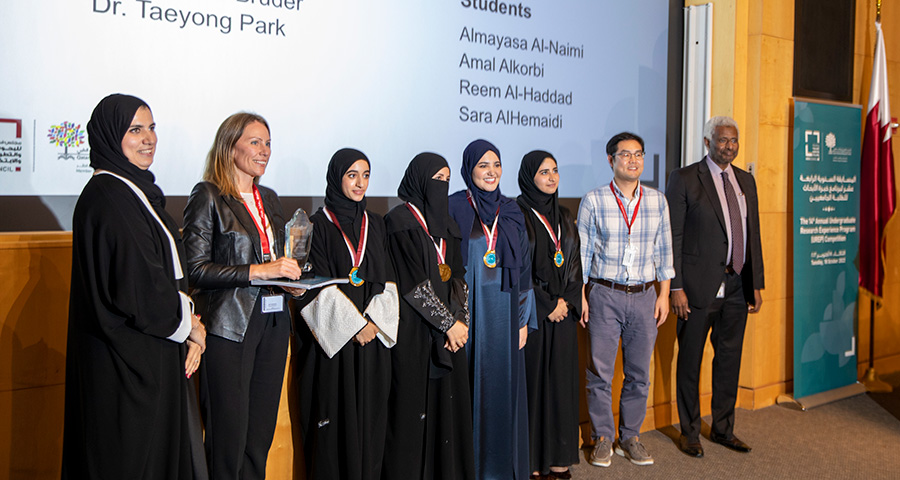
CMU-Q alums win QNRF UREP research competition
Four recent grads awarded for research conducted as undergraduates at Carnegie Mellon
A team of four graduates from Carnegie Mellon University in Qatar (CMU-Q), a Qatar Foundation partner university, won first place at the 14th Annual Undergraduate Research Experience Program (UREP) Competition. The project is titled: “Conservation and biodiversity in Qatar: Surveying awareness and attitudes toward Qatari fauna.”
Reem Al-Haddad, Sara AlHemaidi, Amal Alkorbi, and Almayasa Al-Naimi began their research when they were undergraduate students at CMU-Q. The project delved into Qatar residents’ awareness and attitudes of threatened animals indigenous to Qatar, and was funded by a UREP grant from Qatar National Research Fund (QNRF).
Michael Trick, dean of CMU-Q, congratulated the research team: “At Carnegie Mellon, we encourage our students and faculty to do research that will make a difference. This research team looked at one aspect of the very real challenge of animal conservation, and we are so pleased to see their work recognized.”
Faculty advisor Jennifer Bruder, associate teaching professor of psychology, said: “We are incredibly proud of these researchers. This project is the first of its kind in Qatar, and the students worked very hard to contribute to a body of research that can be applied to education, policy making and can be used in future research to further explore how to support biodiversity efforts in Qatar. ”
Taeyong Park, assistant teaching professor of statistics, and Lauren Burakowski also served as faculty advisors on the project.
More than 75 projects were eligible for the competition, and only five were selected for the oral presentation category, including projects from Qatar University, Texas A&M University at Qatar, and University of Doha for Science and Technology.
The project surveyed more than 2,000 residents of Qatar who hail from 96 unique nationalities. Participants were asked about their awareness and attitudes of five animals that are indigenous to the Arabic Gulf. All five animals are threatened species and on the red list according to the International Union for Conservation of Nature (IUCN).
Overall, the study demonstrates that animals which are more likeable will receive more attention for conservation than animals that humans find less desirable. These preferences influence human decision making, and have important implications for how to shape education and policy. The study also suggests that increasing liking of animals among the local population would increase support for conservation efforts.
All four researchers completed their bachelor of science degrees in information systems, also earning minors in psychology. The project was the only social science oral presentation in this year’s competition.
